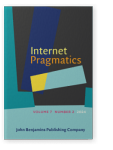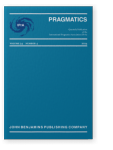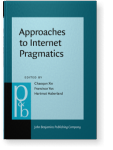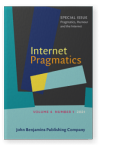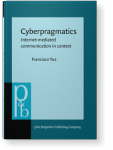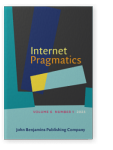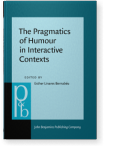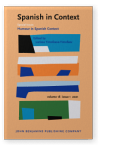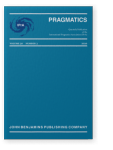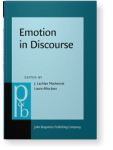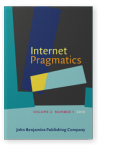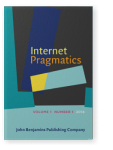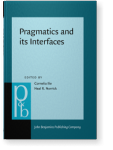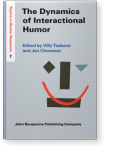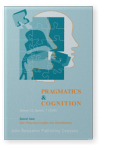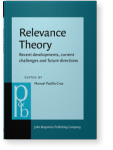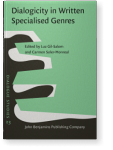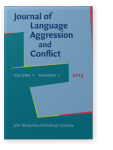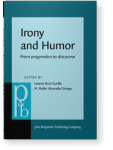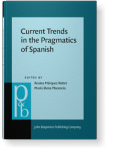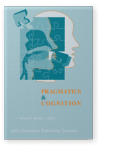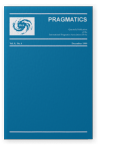Francisco Yus
List of John Benjamins publications for which Francisco Yus plays a role.
Journals
Approaches to Internet Pragmatics: Theory and practice
Edited by Chaoqun Xie, Francisco Yus and Hartmut Haberland
[Pragmatics & Beyond New Series, 318] 2021. vii, 348 pp.
Subjects Communication Studies | Discourse studies | Pragmatics | Sociolinguistics and Dialectology
Pragmatics, Humour and the Internet
Edited by Francisco Yus
Special issue of Internet Pragmatics 4:1 (2021) v, 175 pp.
Subjects Communication Studies | Discourse studies | Pragmatics
Subjects Discourse studies | Humor studies | Pragmatics
Cyberpragmatics: Internet-mediated communication in context
Francisco Yus
[Pragmatics & Beyond New Series, 213] 2011. xiv, 353 pp.
Subjects Communication Studies | Pragmatics
2023 Finding relevance in smartphone advertising Internet Pragmatics 6:1, pp. 1–41 | Article
Smartphone ads compete for the user’s attention, which is initially intended to focus on other areas of the small screen of the device. Despite this competition, smartphone advertisements aim to produce as much cognitive reward as possible in exchange for the mental effort expended in their… read more
2023 Interpreting Covid-related memes: The role of inferential strategies and context accessibility The Pragmatics of Humour in Interactive Contexts, Linares Bernabéu, Esther (ed.), pp. 6–31 | Chapter
One of the sources of relief, entertainment and socialisation during the Covid pandemic lockdown was the massive exchange of memes on social media and messaging applications. The objective of this chapter is to analyse and categorise 150 Peninsular Spanish memes collected from different… read more
2021 Introduction: Approaching internet pragmatics Approaches to Internet Pragmatics: Theory and practice, Xie, Chaoqun, Francisco Yus and Hartmut Haberland (eds.), pp. 1–23 | Introduction
2021 Incongruity-resolution humorous strategies in image macro memes Pragmatics, Humour and the Internet, Yus, Francisco (ed.), pp. 131–149 | Article
In previous research (Yus 2016, 2017), a classification of jokes was proposed depending on how the humorous incongruity-resolution strategy was achieved. Twelve cases were isolated resulting from the combination of several parameters: (1) a differentiation between discourse-based incongruities… read more
2021 Chapter 3. Cyberpragmatics in the age of locative media Approaches to Internet Pragmatics: Theory and practice, Xie, Chaoqun, Francisco Yus and Hartmut Haberland (eds.), pp. 75–105 | Chapter
One of the aims of cyberpragmatics (Yus 2001, 2010a, 2011a, 2013) is to explain the role that interfaces play in the (un)successful outcome of virtual interactions, and their mediation in the management of the relevance-related formula of comprehension. However, many things have changed in the… read more
2021 Pragmatics of humour in memes in Spanish Humour in Spanish Context, Timofeeva-Timofeev, Larissa (ed.), pp. 113–135 | Article
In this paper the discourse of a specific type of meme in Spanish, the image macro, is analysed, together with several ways in which memes generate humorous effects. Two main areas are addressed: (a) how humour arises from the processing of the text in the meme (decoding of the text plus further… read more
2021 Pragmatics, humour and the internet Pragmatics, Humour and the Internet, Yus, Francisco (ed.), pp. 1–11 | Introduction
2020 Bonding across Chinese social media: The pragmatics of language play in “精 (sang) 彩 (xin) 有 (bing) 趣 (kuang)” construction Pragmatics 30:3, pp. 431–457 | Article
This paper explores social bonding in language play via the construction of ‘Chinese character (annotation)’ on two major social media platforms (Sina Weibo and WeChat) in China. The Chinese characters and their bracketed annotations under study, despite their one-to-one matching in sequence,… read more
2019 Chapter 7. A cognitive pragmatics of the phatic Internet Emotion in Discourse, Mackenzie, J. Lachlan and Laura Alba-Juez (eds.), pp. 161–188 | Chapter
Phatic interpretations are typically defined as those arising from an intention to create and maintain ties and social bonds, rather than an intention to transfer substantive information. As such, they are not typical instances of communication in which the eventual relevance centers upon the value… read more
2019 Internet pragmatics and the future: A reply to Fetzer, Jucker and Page Internet Pragmatics 2:1, pp. 50–53 | Reply
2019 An outline of some future research issues for internet pragmatics Internet Pragmatics 2:1, pp. 1–33 | Discussion
Internet communication has evolved a lot since it first became popular in the early nineties of the last century. Pragmatics has also evolved and has tried to come to terms with the non-stop changes that internet is constantly producing in our lives and especially in how we communicate and… read more
2018 Introducing internet pragmatics Internet Pragmatics 1:1, pp. 1–12 | Article
The internet and internet-mediated life have presented new issues and challenges for research on pragmatics. When analyzing the application of pragmatics to internet-mediated communication, a possibility is to set up a number of layers and study the contributions that traditional pragmatic… read more
2018 The interface between pragmatics and internet-mediated communication: Applications, extensions and adjustments Pragmatics and its Interfaces, Ilie, Cornelia and Neal R. Norrick (eds.), pp. 267–290 | Chapter
The aim of this chapter is to apply pragmatics to internet-mediated communication. On paper, two broad and apparently incompatible premises constitute the foundation of these distinct applications: (1) internet-mediated communication “makes no difference” for a pragmatic analysis (we do not have… read more
2018 Identity-related issues in meme communication Internet Pragmatics 1:1, pp. 113–133 | Article
Internet memes are an example of the trend of replicability and spread of discourses through the Net within today’s participatory culture. On paper, memes are instances of humorous discourse that abound on the internet, are replicated or altered, and then transmitted to other users. However, in… read more
2018 Chapter 12. Positive non-humorous effects of humor on the internet The Dynamics of Interactional Humor: Creating and negotiating humor in everyday encounters, Tsakona, Villy and Jan Chovanec (eds.), pp. 283–304 | Chapter
In this chapter, the term (non-)intended non-propositional effect is proposed and applied to the kind of feeling, emotion, impression, etc. that internet humorous texts generate in the user beyond the proposition-centered humor, and which may not be tightly connected to the act of communication.… read more
2016 Propositional attitude, affective attitude and irony comprehension New Theoretical Insights into Untruthfulness, Dynel, Marta (ed.), pp. 92–116 | Article
According to relevance theory, irony comprehension invariably entails the identification of some opinion or thought (echo) and the identification of the speaker’s dissociative attitude. In this paper, it is argued that it is also essential for hearers to identify not only that propositional… read more
2016 Relevance theory and contextual sources-centred analysis of irony: Current research and compatibility Relevance Theory: Recent developments, current challenges and future directions, Padilla Cruz, Manuel (ed.), pp. 147–171 | Article
In this paper, several claims compatible with the relevance-theoretic view of irony comprehension are proposed, beyond the essential requirement of the identification of the speaker’s dissociative attitude and the location of a source of the echo. Firstly, a view of context accessibility in terms… read more
2014 Chapter 7. Interactions with readers through online specialised genres: specificity or adaptability? Dialogicity in Written Specialised Genres, Gil-Salom, Luz and Carmen Soler-Monreal (eds.), pp. 189–208 | Article
Success in written academic communication depends on the presence of elements
related to author-reader interactions which supplement propositional
information in the text, help readers reach the intended interpretation and
shape the author’s identity. But is this claim equally valid for online… read more
2013 Towards a cross-cultural pragmatic taxonomy of insults Journal of Language Aggression and Conflict 1:1, pp. 87–114 | Article
The aim of this paper is to explain the use of insults from a relevance-theoretic perspective. To that end, our analysis takes into consideration four variables that, we believe, play a major role in how insults are produced an interpreted: (a) the conventional or innovative nature of the insult;… read more
2013 An inference-centered analysis of jokes: The intersecting circles model of humorous communication Irony and Humor: From pragmatics to discourse, Ruiz-Gurillo, Leonor and M. Belén Alvarado Ortega (eds.), pp. 59–82 | Article
In previous research (Yus 2008, 2009, 2010, 2012), a distinction was made, in a general classification of jokes, between those that are based on the speaker’s manipulation of the audience’s interpretive steps leading to an interpretation of the joke, and those whose main source of humor lies in the… read more
2004 14. Pragmatic of humorous strategies in El club de la comedia Current Trends in the Pragmatics of Spanish, Márquez Reiter, Rosina and María Elena Placencia (eds.), pp. 319–344 | Chapter
1999 Misunderstandings and explicit/implicit communication Pragmatics 9:4, pp. 487–517 | Article
